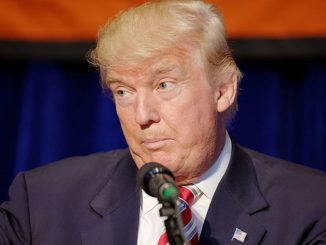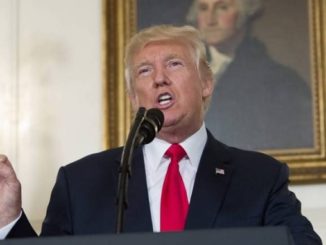
During a press conference at the United Nations General Assembly on September 26, President Donald Trump made clear how he feels about the criticism he’s gotten from other countries over his decision to pull out of the Iran nuclear agreement and resurrect stifling sanctions in November, stressing that for him, “it doesn’t matter what world leaders think,” Bloomberg informed.
Like Trump, Secretary of State Michael Pompeo and national security adviser John Bolton have both lashed out against Iran’s leaders and the European Union for trying to preserve the nuclear deal Trump quit in May.
A handful of employees from the U.S. State and Treasury departments have also quietly toured the globe, visiting world capitals and corporate headquarters to persuade foreign governments and companies to shun the Iranian market. The choice they present has been simple: Do business with America, the biggest economy in the world, or do business with Iran and face sanctions and banishment from the U.S. financial system.
“What we have now is a big game of chicken. Whatever you might say about the president and his rhetoric, the people running this file know what they’re doing,” says Anthony Rapa, a lawyer at Kirkland & Ellis who focuses on sanctions compliance. Rapa is impressed thus far with how effective Pompeo’s team has been in isolating Iran.
Members of the Iran Action Group have visited more than 30 countries so far, meeting with senior officials and company representatives. They lay out the U.S. view of Tehran’s “malign behavior” in the Middle East and around the globe. But their real goal is to convey in detail just how far the U.S. is prepared to go to inflict economic pai, chiefly through secondary sanctions, on companies that expect to get a reprieve if they keep up business ties with Iran, Bloomberg added.
And so far they’ve been persuasive – with a so-called Divestment Tracker kept by the group lists 80 or so companies, ranging from Total and Munich Re Group to KLM Royal Dutch Airlines and Mazda Motor, that have backed out of the Iranian market over the past several months. More important for Iran, which derives 80 percent of its tax revenue from oil sales, exports of its oil products have fallen 40 percent from a high point of 2.8 million barrels a day in April, the month before Trump backed out of the nuclear accord.
That decline surpassed even the most bearish forecasts. “Iran exports are going to drop more than what the market expected only a couple of months ago,” says Ben Luckock, co-head of oil trading at Trafigura Group, one of the world’s largest commodities merchants. “When we add every country that we think will continue buying, we struggle to see exports much more above 1 million barrels a day.”
The Iran Action Group’s cast of characters includes a former explosives ordinance expert, Jason Shell; David Tessler, a mild-mannered sanctions expert with two tweets to his name; Michelle Giuda, who was once Newt Gingrich’s spokeswoman and was also a national gymnastics champion at the University of California at Los Angeles; and a former New York ad man, Len Khodorkovsky, whose family fled the Soviet Union when he was a child and who now coordinates Pompeo’s anti-Iran messaging campaign.
Their leader is Brian Hook, a foreign policy wonk who worked for the George W. Bush adminstration and advised Mitt Romney’s 2012 presidential campaign. Hook wielded vast power under Pompeo’s predecessor, Rex Tillerson, serving as his policy brain. While his current mandate isn’t as expansive, he’s been given valuable real estate, moving into an office along the State Department corridor known as Mahogany Row. Working a few doors down from Pompeo, he’s essentially taken control of the department’s policy toward Iran, Bloomberg notes.
The group’s effort is putting to the test the proposition that the U.S. economy and dollar are so central to the global economic system that American sanctions alone will isolate Iran’s economy. That runs counter to the conventional wisdom that Obama-era sanctions against Iran were effective only because other nations participated, particularly U.S. allies in Europe.




Be the first to comment